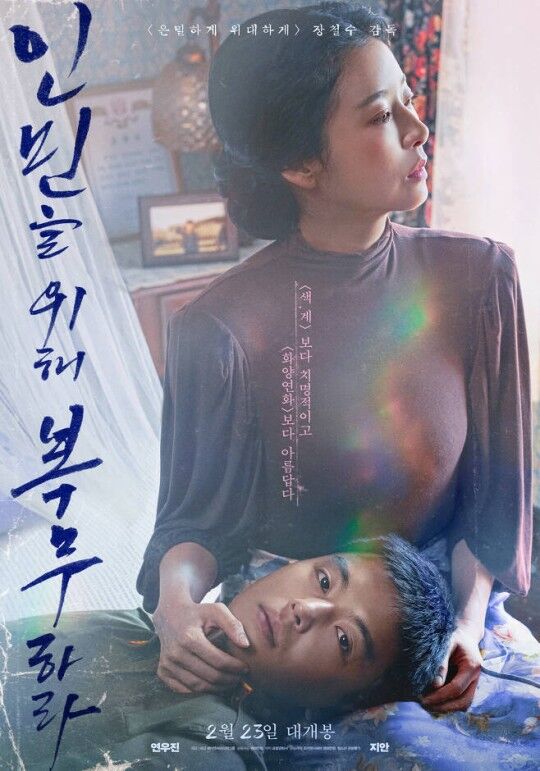



The word problem is too much to say: The problem is a provocative topic or question, and it can be used only when experimenting with film grammar. 'Serve the People! 'The word 'painting' is appropriate.
"Yeon Woo-jin", a poor rural native, joins the military with the intention of entering the military; he is chosen as a model soldier for his sincere military life and becomes a cooker for his "division commander" (Cho Seong-ha) house. His goal is to get on the road to success for his wife and child; while the division commander is on a business trip, his young wife, "Trainer" (Jian), reaches out to the matte with a touch of temptation. The matte crosses the line after conflicting between its goals, beliefs and human Blow-Up.
At first, the power to show up to the wife of the boss was ahead, but from a certain point on, the matte falls into the feeling of crossing Blow-Up and love. The training also feels the joy that can not be felt by the husband who is a sex, and is in love with the relationship with the matte.
It is based on the same name novel by Jennrenker, published in 2005 called "Serve the People! This novel depicts the love story of men and women in the military unit set in the Chinese Cultural Revolution. It is a topic that was subjected to a plate money from the authorities as soon as it was published because it insulted Mao's ideas.
Director Jang Cheol-soo consumes the satire and humorous elements of the original film lightly like feathers, and the reputation of literature is used as accessories for 19 gold-fisted films. "Serve the People! " was a political slogan put forward by Mao Zedong, and it was a language of revolution, but in this film it is written as synonymous with "Take off your clothes" and constantly makes a laugh. As the labor that the matte can do to the training expands from rice and laundry to Flesh service, this word resonates throughout the movie like a signal for sex.
Of course, in the original work, this word is changed from the language of revolution to the language of Blow-Up. However, the advantages of the novel, which is a delicate psychological description, a high symbol, and a scathing satire toward the system, were flattened and funny.
The film spends a considerable amount of time from the first meeting to the moment when the relationship is turned, and the two people explain the situation, but the development of the drama is not smooth and the feeling is broken. So the decisive moment of Flesh relationship is not created tensely, but unfolds like a skit. Since then, the film begins to display the sexual activities of the two.
Those who escaped from the system, ideology, and social obligations that suppressed individuals indulge in each other's bodies and enjoy freedom, but the excitement and liberation that they could feel in type does not feel like a video. Sex acts close to the feast and stunt of Flesh color come boring from some point.
He also brought the original work and blurred the background of the times. In the 1970s, it took an ambiguous stance to set up a virtual country, not China or North Korea, although it is a socialist country. In addition, the ambassadors of the main characters explain the oppression and suffering they feel, and the camera repeatedly illuminates the socialist ornaments attached to the house of the division, but it is only a mechanical substitution and symbol.
Ultimately, the film tries to draw the freedom and love of the oppressed individual in socialism, but the context of the postwar period is not organically connected, so the intention of satire and humor does not shine. The running time is 2 hours and 26 minutes by putting cookie video in the main part, but the director's intention to direct is only outward and not delivered properly.
The performance of the actors is also very different. First of all, the courage of the two main characters who performed the Jeolla performance, which was even a body hair Exposure for the movie, deserves applause. However, it seems that the resolution that has invested for the work can not lead to favorable reviews.
Yeon Woo-jin plays a sincere and good performance as the main character and speaker of the movie. It is also externally matched with the character, and it has shaped the unstable inner and outer surface of the matte with stable vocalization and acting ability.
The problem is Jian, who played the training, which is incredible even as he sees that an actor with more than 10 years of acting experience shows this level of acting skills. "It was a deliberate directing," the director said of Jian's ambassador handling, which seemed to show the essence of "robot acting." However, the director's intentions rarely seem, leaving only the acting that did not contain the actor.
Jang Cheol-soo is a box office director who has mobilized 6.95 million viewers nationwide with "Secretly Great" (2013). At that time, Kim Soo-hyun's popularity was great, but he had a sense of capturing the public. The clear theme consciousness that was shown in his debut film 'The Whole Word of Kim Bok Nam' (2010) is also hard to find in this film.
The phrase "Service to the People" is a copy of "color, system" and "white and white" in the copy phrase. It is not only a comparison but also a marketing that feels bad. The main characters shout "Serve the People!", but they should apologize to the audience who endured the movie.